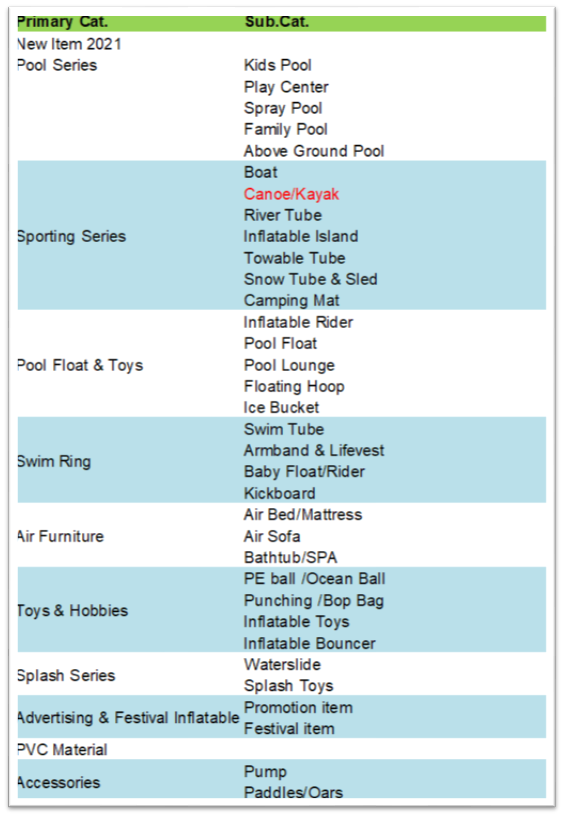PD Toys plastic Co., Ltd is OEM & ODM manufacturer of inflatable products in the mainland of China with more 17 years of manufacturing experience. products ranges are Inflatable Toys, inflatable pools, inflatable pool floats, towable tubes, Air Furniture and Promotional Items etc. total have more than 1500 employees (4 factories) related to PVC inflatable products.
Operated under ISO 9001:2015 management system, We had passed factory Audit by Walmart, Taret, Disney ect, also passed all necessary certificates and testing such as ICTI, BSCI, SEMTA,Target FA, NBC Universal, FCCA, SGS, CVS Security, GSV, Disney FAMA ect. We have our own PVC raw materials manufacturing company, all the PVC we produced are compliance with European EN71, American ASTM standard and NON PHTHALATE (6P) standard.
Inflatable Pool Lounge,Pool Float Inflatable,Floating Bed,Floating Chair P&D Plastic Manufacture Co., Ltd , https://www.jmairfuniture.com
The high demand for petrochemical products in the Asia-Pacific region can be seen from the sales of ExxonMobil products. In 2007, ExxonMobil sold approximately 27 million tons of petrochemical products, and 30% came from Asia, most of which were sold to the Chinese market. ExxonMobil also plans to increase its basic petrochemical plant capacity built in Asia and the Middle East by 60% to 8 million tons/year in the next few years. The company believes that in the next 10 years, Asia will account for 60% of the total growth in global petrochemical product demand, and China alone will account for 1/3. By 2015, at least 50% of chemical demand will come from Asia.
The huge demand in the Chinese market has prompted ExxonMobil Chemical to launch several major investment plans for Asia, especially the Chinese market, in the past two years. In March 2007, an integrated joint venture of Fujian Refining, Chemicals, and refined oil marketing established by Exxon Mobil Chemical and Sinopec, Fujian Province, and Saudi Aramco was formally established. The joint venture's plant includes an 800,000-ton ethylene cracker. Polyethylene and polypropylene plants, 700,000 tons/year paraxylene aromatics unit, etc. It is expected that these devices will be put into production in 2009.
Faced with the strong growth in the Asian petrochemical market, Shell East Petroleum's 800,000-ton ethylene plant in Wugong Island, Singapore was put into operation in early 2007 and will be put into production in 2009. The 1 million-ton/year ethylene unit built by ExxonMobil Chemical in Singapore will also be completed in early 2011. Its downstream installations include two 600,000-ton/year PE production lines, 450,000 tons/year PP units, 300,000 tons/year of special elastomer capacity, and 340,000 tons/year of pure benzene units. In addition, Exxon Mobil also plans to expand its carbonyl alcohol plant capacity in Singapore by 125,000 tons/year.
Cross-border investment in the Middle East is also increasing. ExxonMobil and Sabic have joint ventures in Jubail and Yanbu in Saudi Arabia, with a view to large-scale expansion in these production sites. They will add carbon black and special plastics and rubber production facilities in Saudi Arabia, including butyl rubber, ethylene propylene rubber, butadiene rubber, styrene-butadiene rubber and thermoplastic polyolefin elastomers, and are expected to start production in 2011.
In Qatar, last year, ExxonMobil and Qatar Petroleum Co., Ltd. jointly built an ethylene cracker with an ethylene capacity of 1.3 million tons/year. The downstream equipment includes 570,000 tons/year LLDPE (linear low-density polyethylene) and 420,000 tons/year. Annual LDPE and 700,000 tons/year of ethylene glycol are expected to be completed and put into operation in 2012.
South Korea’s Hunan Petrochemical Company and Qatar International Industrial Holdings, a subsidiary of Qatar Petroleum, formed a joint venture of olefins and derivatives in mid-July last year in Mercedes, Qatar. Hunan Petrochemical Company will invest 390 million U.S. dollars, 30% of which will be held in the joint venture project, and Qatar International Industrial Holding Company will hold 70% of the shares. The device will be put into operation in the second half of 2011, with a capacity of 700,000 tons/year PP, 600,000 tons/year styrene monomer and 220,000 tons/year polystyrene.
British Lucite International signed a contract with Saudi Arabian International Petrochemical Company (Sipchem) in late May last year to build a MMA (methyl methacrylate) plant in Jubail, Saudi Arabia. The capacity of the device is 250,000 tons/year MMA, which is expected to start production in 2011.
Saudi Aramco and Dow Chemical's joint petrochemical and plastics joint venture with 50% stake in Eastern Saudi Arabia will be one of the world’s largest new construction projects. The Ras Tanura Integrated Project, which is planned to be put into operation from 2012 to 2013, will have a project investment of more than US$15 billion and will produce a variety of petrochemical products such as ethylene, propylene, aromatic hydrocarbons, ethylene oxide and ethylene glycol, and propylene oxide. And propylene glycol, chlor-alkali, vinyl chloride monomer, polyethylene, polyurethane, epoxy resin, polycarbonate, amines and glycol ethers.

The focus of multinational companies' chemical investment accelerates eastward to Asia and the Middle East
The form is becoming more and more obvious. Asia Pacific and the Middle East continue to be the focus of investment by multinational companies. The acceleration of the pace of construction of low-cost petrochemical devices in the Middle East will not only meet the needs of the Asia Pacific market, but will also enable North America to shift from a net chemical exporter to a net importer by the end of 2010.